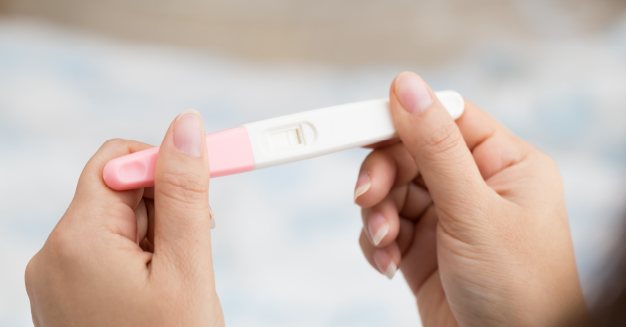In this blog post, we will explore the relationship between UTIs and pregnancy test results. By understanding the factors that influence test results, the physiological changes associated with UTIs and pregnancy, and the reliability of at-home pregnancy testing, we can shed light on this sensitive topic and provide clarity for those experiencing these situations.
How Pregnancy Tests Work
Most at-home pregnancy tests are 98-99% accurate when used as the instructions suggest, but there is still a 1-2% window of error that can occur. Even blood pregnancy tests taken at a doctor’s office can lead to false negative pregnancy test results if the test is taken in very early pregnancy. Pregnancy tests detect the presence of the human chorionic gonadotropin (hCG) hormone in someone’s body. When an individual becomes pregnant, hCG hormone levels rapidly increase as the pregnancy progresses. Eventually, this hormone enters the bloodstream and urine.
Detecting hCG in urine or blood samples is the purpose of all pregnancy tests. The hCG will bind to the test’s antibodies, triggering a reaction. The sensitivity of pregnancy tests differs, in some cases an individual might get a positive result as early as ten days after conception, but sometimes it can take up to six weeks of pregnancy to get a positive result on an at-home test.

Understanding UTIs
Urinary tract infections, often referred to as UTIs, are bacterial infections that occur in any part of the urinary system, such as the bladder, urethra, and kidneys. UTIs develop when bacteria from the digestive system enter the urinary tract through the urethra. They’re more common in women than men due to the shorter length of the female urethra, allowing the bacteria to reach the bladder easier. Roughly 50% of women have experienced a UTI at least once.
Symptoms of UTIs can vary but often include:
- Frequent and urgent need to urinate
- Burning sensation during urination
- Cloudy or strong-smelling urine
- Lower abdominal pain or discomfort
- Fever
There are a few different forms that UTIs can occur in, such as:
- Cystitis (infection of the bladder)
- Urethritis (infection of the urethra)
- Pyelonephritis (infection of the kidneys)
A severe UTI is characterized as when the infection spreads beyond the bladder and reaches the kidneys, which can result in these symptoms:
- Nausea and vomiting
- Fatigue and weakness
- High fever
- Blood in urine
Prompt diagnosis and treatment are important to prevent the infection from spreading and leading to potential complications, such as causing sepsis, which is the body’s extreme response to an infection and can lead to death. Staying hydrated, urinating regularly, practicing good hygiene, and avoiding irritants can help ward off UTIs. In the event you do develop a UTI, it can be treated with antibiotics. If you suspect you may have a severe UTI, please seek emergency care.
Factors Affecting Pregnancy Test Accuracy
There are several factors that can influence your test results in that 1% of false positive or negative pregnancy test results. Understanding these factors is essential to obtaining reliable results.
Timing
The timing of taking a pregnancy test plays a significant role in determining its accuracy. Testing too early can result in a false negative pregnancy test result as the levels of hCG may not be detectable yet. Waiting until after a missed period or 21 days after unprotected sex is recommended to achieve more accurate results.
Test Quality and Storage
Make sure to check the expiration date before using or buying a pregnancy test. Also, if a pregnancy test has been exposed to extreme temperatures or moisture, it can compromise the test’s reliability.
Proper Usage
Please take care to carefully follow the instructions provided with the test. Not using first-morning urine or not waiting the recommended time before reading the results can affect accuracy. Additionally, the evaporation line on a test can appear after the designated time has passed, falsely appearing as a positive result.
Medications and Medical Conditions
Certain medications can interfere with pregnancy test results, especially if the medication is for fertility or has hCG in it. Additionally, ovarian cysts and certain types of tumors that produce the hCG hormone can also lead to a false positive pregnancy test.

Additional Factors That Can Give Inaccurate Results
Depending on your fertility journey, there are some additional instances where you could receive a false positive test result.
Chemical Pregnancy
This is the term used to describe an early miscarriage, around the fifth week of pregnancy. This is late enough where a pregnancy test can detect hCG in your body but too early for an ultrasound.
Ectopic Pregnancy
An ectopic pregnancy is when a pregnancy implants itself outside the uterus. These pregnancies are rare and are incredibly dangerous to the health of the mother. Even though the pregnancy is not viable, your body will still produce higher amounts of the hCG hormone.
How UTIs Can Affect Test Results
If you’ve been wondering if a UTI can cause a false positive pregnancy test result or not, the answer is that they typically do not directly affect the accuracy of at-home tests. UTIs are bacterial infections that primarily affect the urinary system, while pregnancy tests detect the presence of the hCG hormone in the body. UTIs do not alter hCG levels significantly, so they should not interfere with test results.
However, there are some factors associated with UTIs that could indirectly impact pregnancy test results.
Over-the-Counter Medications for UTIs
Medications that help with the discomfort of UTIs, such as AZO, can make a pregnancy test difficult to interpret. Due to the dye in those medications, which helps soothe the lining of the urinary tract, the result window may be difficult to read. Since these medications normally dye your urine an orange-red color, it can cloud the results of an at-home pregnancy test.
Difficulty With Urine Flow
One UTI side effect that some people experience is difficulty or pain controlling urine flow. Since at-home pregnancy tests depend on urine to measure the amount of hCG present in your body, too much or too little urine can impact the test’s accuracy. Excessive urine could affect test results by not allowing the test strip to bond to any hCG molecules in your urine. If you can’t collect enough urine on the test trip, then you might receive a negative result.
Too Much Water Intake
Drinking plenty of water can help with UTI symptoms and can help flush out the bacteria causing the bacterial infection. However, too much water can dilute your urine and make the test less accurate.
How to Proceed With Testing
So, can a UTI cause a false test result on an at-home pregnancy test? Technically no, but some factors involved with UTIs can make it difficult to take or interpret the results of a pregnancy test. False positive results on pregnancy tests are generally caused by factors unrelated to UTIs, such as medications or underlying medical conditions.
If you suspect you may be pregnant and have received a positive result on a pregnancy test, it is recommended to consult with a healthcare professional for confirmation. They can provide accurate and reliable testing methods to confirm or rule out pregnancy.
Additionally, if you suspect a UTI or experience persistent symptoms, seeking medical attention is crucial for proper diagnosis and treatment. False positive results on pregnancy tests are rare, but they can happen for various reasons unrelated to UTIs. Understanding the accuracy of pregnancy tests, following the instructions carefully, and seeking professional advice can help alleviate any confusion or anxiety that may arise from the testing process.


